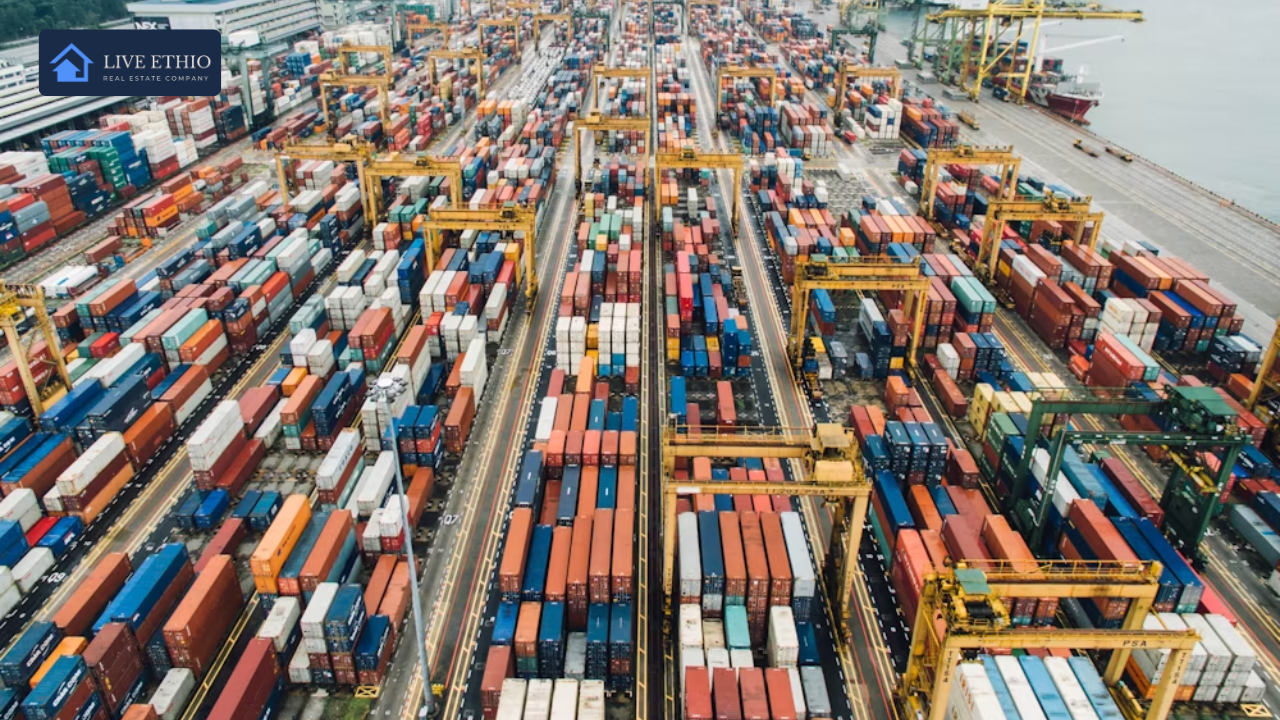Ethiopia is one of Africa’s fastest-growing economies, attracting global attention from investors, entrepreneurs, and diaspora communities. From agriculture and textiles to construction and real estate, trade plays a vital role in driving the country’s development. But before jumping into business opportunities, it’s essential to understand the import and export laws in Ethiopia. Knowing how the system works can save you time, money, and prevent costly mistakes.
In this guide, we’ll break down what you need to know about getting an import-export license, the restrictions you should be aware of, and what you can bring into the country duty-free.
How to Get an Import-Export License in Ethiopia
If you’re planning to trade goods into or out of Ethiopia, the first step is obtaining an import-export license. The process is managed by the Ministry of Trade and Regional Integration (MoTRI), and it is designed to ensure that businesses are legitimate and capable of handling international trade.
Here’s how the process typically works:
- Business Registration – You need to register your business as a sole proprietorship, partnership, or company. This step includes getting a Taxpayer Identification Number (TIN).
- Application Submission – Apply for an import-export license at the Ministry of Trade. You’ll need to provide your TIN certificate, business registration documents, and an application form.
- Bank Account & Capital Requirements – To qualify, you must have a business bank account and sufficient capital. For some goods, minimum capital requirements may apply.
- Sector-Specific Permits – If you plan to trade in restricted items (such as pharmaceuticals or chemicals), you may need approval from relevant government authorities.
- Approval & Issuance – Once approved, the Ministry issues the license, allowing you to start importing and exporting legally.
The process usually takes a few weeks, but delays can occur if paperwork is incomplete. Many Ethiopian diaspora investors hire local consultants to navigate the bureaucracy more smoothly.
For real estate investors importing construction materials, or diaspora families bringing furniture for their apartment for rent or house for sale projects, getting this license is the foundation for moving goods efficiently.
Import and Export Restrictions in Ethiopia
Like many countries, Ethiopia enforces restrictions on certain imports and exports to protect public safety, the environment, and cultural heritage. Understanding these rules is essential before shipping goods.
Restricted or Prohibited Imports:
- Weapons and ammunition – Only authorized institutions like the military and police can import arms.
- Harmful chemicals and pesticides – Controlled due to environmental and health risks.
- Cultural artifacts and antiques – Restricted to prevent illegal trade of Ethiopian heritage.
- Certain used goods – Old tires, second-hand clothes, and vehicles beyond a specific age limit are restricted.
Restricted or Prohibited Exports:
- Raw coffee beans were once heavily regulated, although reforms have opened the sector to more exporters.
- Live animals may face restrictions to control disease spread.
- Gold and precious minerals require special permits to prevent smuggling.
For example, if you’re a business planning to export Ethiopian textiles or agricultural products, you’ll need to comply with international quality standards and local export regulations. Likewise, someone buying a house for sale in Addis Ababa who wants to bring in home appliances must check if they are permitted for import.
What Duty-Free Items Can I Import to Ethiopia?
Duty-free benefits are one of the most attractive incentives for investors, returning diaspora, and even NGOs operating in Ethiopia. The Ethiopian Customs Commission allows certain categories of goods to enter without import taxes.
Common Duty-Free Imports Include:
- Personal items for returning residents and diaspora – Ethiopians returning after living abroad for two or more years can bring personal belongings, including one car, duty-free.
- Investment-related goods – Investors with approved projects can import capital goods, machinery, and construction materials duty-free. This is especially helpful for real estate developers building apartments for sale or houses for rent.
- NGO and diplomatic imports – Items for humanitarian use, educational institutions, and diplomatic missions are often exempt.
- Raw materials for manufacturing – To encourage local production, the government allows duty-free import of certain raw materials.
It’s important to note that duty-free status requires prior approval and proper documentation. Misuse of the privilege can lead to fines or revocation of the license.
Why Understanding Import-Export Laws Matters
For Ethiopia’s economy, trade is more than just numbers. It’s a bridge connecting local businesses with global opportunities. For individuals, especially the diaspora, knowing the rules helps avoid delays and penalties.
Consider a family moving back to Addis Ababa who wants to ship furniture and a car duty-free. Without understanding the guidelines, they might face unexpected taxes at customs. Similarly, an investor bringing in machinery to construct a housing project must ensure they apply for duty-free privileges in advance.
Understanding import-export laws also directly supports Ethiopia’s real estate growth. Developers bringing in finishing materials, or companies importing technology for modern apartment complexes, rely on efficient trade processes. This, in turn, helps provide better apartments for rent, houses for sale, and modern living spaces for the growing urban population.
Ethiopia offers enormous opportunities for trade and investment, but success starts with understanding the legal framework for imports and exports. Whether you’re an investor, a returning diaspora member, or a business owner, taking the time to learn about licenses, restrictions, and duty-free benefits will save you from costly mistakes.
In the bigger picture, efficient trade supports Ethiopia’s modernization—from building high-rise apartments for sale to creating more affordable houses for rent in Addis Ababa. By following the rules, you not only protect your business but also contribute to Ethiopia’s economic transformation.
